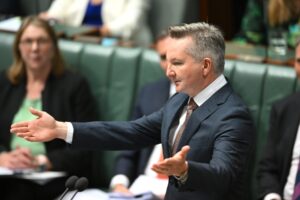The UK government has told the Bank of England it must prioritise transitioning to a net zero economy when setting monetary policy, in a move that enshrines sustainability in the central bank’s official remit.
It will mean, among other things, that the Bank of England will no longer purchase bonds issued by companies or organisations that are not in-step with Paris-aligned decarbonisation. It also means the days of climate policy being derailed by economic crises are likely over – at least in Britain.
The Bank of England was already arguably the greenest central bank in the world, having put climate change at the centre of its concerns under former governor Mark Carney.
But this step goes further, making sustainability and climate a formal, government-mandated priority of the bank, consolidating Carney’s efforts to put climate change at the centre of its remit.
The Bank of England holds real sway with other central banks and financial regulators around the world, including Australia. It is a leading member of the Network for Greening the Financial System, a group of 80 central banks that includes the Reserve Bank of Australia. The US Federal Reserve for a long time shunned the organisation, but finally joined in December.
The Reserve Bank of Australia has already named climate change as a major concern, as has the Australian Prudential Regulation Authority, which serves the same function as the Bank of England’s prudent regulation arm. Neither, though, have been told to consider climate change by the federal government, whose total lack of interest in the economic risks of climate change – as well as its lack of serious emissions reduction policy – has sent confusing signals to companies wondering how they should approach the issue.
But the UK government’s move shows how the rest of the world is thinking about climate change, and will only put more pressure on the Australian government at the UN COP26 climate conference in Glasgow later this year.
In a letter to the Bank governor Andrew Bailey, UK treasurer Rishi Sunak wrote: “I am today updating the [Monetary Policy Committee’s] remit to reflect the government’s economic strategy for achieving strong, sustainable and balanced growth that is also environmentally sustainable and consistent with the transition to a net zero economy.”
The Bank of England welcomed the move, and said in a short statement: “In the coming months we will provide more information about our proposed approach to adjusting the Corporate Bond Purchase Scheme (CBPS) to account for the climate impact of the issuers of the bonds we hold, with a view to adapting our approach by the time of our next scheduled round of reinvestment operations in 2021 Q4.”
Under the CBPS, the Bank of England buys up corporate bonds on the secondary market in an effort to reduce the cost of borrowing and encourage investment in growth assets – the idea being both actions will stimulate economic activity.
Exactly how the new climate remit will affect this bond-buying program remains to be seen, but the likely result will be that bonds issued by carbon heavy companies, or companies without clear plans to reach net zero, will not be eligible.
In theory that should mean yields in those companies will remain higher than yields in greener companies, meaning the cost of borrowing for carbon heavy companies will likewise remain higher. If that tactic were adopted by other central banks, it could become a significant factor in determining the cost of borrowing for carbon-heavy businesses.
But even if it does not have that effect, it will likely still send waves of influence through the financial world. There are few more influential institutions in the financial world the the Bank of England, so it will almost certainly reinforce a culture among investors of taking climate risk seriously, aiding the shift to decarbonisation.










